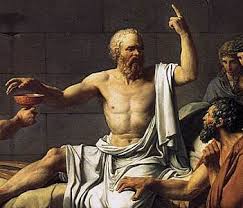[fusion_builder_container hundred_percent=”yes” overflow=”visible”][fusion_builder_row][fusion_builder_column type=”1_1″ background_position=”left top” background_color=”” border_size=”” border_color=”” border_style=”solid” spacing=”yes” background_image=”” background_repeat=”no-repeat” padding=”” margin_top=”0px” margin_bottom=”0px” class=”” id=”” animation_type=”” animation_speed=”0.3″ animation_direction=”left” hide_on_mobile=”no” center_content=”no” min_height=”none”]
Great teachers come in all shapes and in all sizes. But to my way of the thinking the greatest teacher in Western history is Socrates. Sure, his bombastic ways and eccentric personality might strike modern students as odd or even offensive. But he would still be a decisive figure in the lives of his students. Here’s why:
#5: Teenagers absolutely love him! In Ancient Athens Socrates was the best show in town. He was unkempt, slovenly, and generally known to be the ugly man in Athens. And yet, he gallivanted around town intellectually jousting and accosting those who claimed to know the contents of love (The Symposium), justice (The Republic), or friendship (Lysis). Socrates’s fidelity was not to a man of noble birth or a soldier of high military rank, but to the contents of Truth (Yes, capital “T” Truth!!!) itself. Socrates’s animated questioning of those who claimed to know important truths of the human condition—better known as a dialectic—was the stuff of theatre to the youth of Athens who enjoyed watching “the ugliest man” verbally eviscerate the effete of Athenian society. Crito, Glaucon, and most famously Plato, were so entranced by the verve of Socrates they followed him around Athens en masse, even to the prison cell where he consumed the hemlock ending his life.
#4: He can take a joke. The greatest teachers can get as good as they give. The best teachers know how to laugh at themselves and while they certainly take themselves and their subject matter seriously, they know healthy doses of humor pump life into the arteries of a classroom filled with teenagers. Socrates was certainly capable of taking a ribbing from the very community he attempted to edify. In Aristophones’s The Clouds, Socrates is utterly ridiculous and highly caricatured in order to make light of Athenian intellectual trends. (Instead of simply looking up at the sky he stretches his head back under his bottom and gazes upwards from a lower, more ridiculous posture).
#3: He is not a phony! Teenagers can easily distinguish between paycheck teachers and teachers who instruct in the spirit of Socrates. Socratic teaching is done in the belief that what students learn can be decisive to the life they live, to the people they become, to the causes they promote, and to the beliefs they cherish. In perhaps the most Socratic statement ever uttered by someone other than Socrates himself, Henry David Thoreau writes, “In accumulating property for ourselves or our posterity, in founding a family or a state, or acquiring fame even, we are mortal; but in dealing with truth we are immortal, and need fear no change or accident.” As Socrates famously said, “Wisdom begins in wonder.”
#2: Socrates was common core before the common core. The appeal of Socrates is that he believed Truth was ubiquitous and socially derived through spirited engagement. Subjective perspective could, indeed, yield objective truth if the participants in the process walked a delicate tightrope between admitting one’s biases on one hand and showing a willingness to concede that bias in the face of conflicting reason and information on the other. If this process of utilizing one’s critical consciousness, investigating all sides of an argument, and actively engaging the learning process in the hope of crafting genuine conviction sounds familiar it is because it is a precursor to the modern day advocacy of common core standards. Common core advocates speak of “rigor” and “higher-order thinking.” I guarantee any student in the midst of a Socratic verbal barrage, tethered to an unremitting personality of intellectual honesty would quickly come to the conclusion that multiple-choice tests, cooperative group projects, and classroom lectures pale in intensity. There is no hiding when Socrates stands in front of you. Students might not like this but it would force them to do the one thing so much of modern education doesn’t make them do: think!
#1: Socrates understood his role in the intellectual odyssey of his students. Socrates famously describes the task of philosophy as “learning how to die,” a sentiment seemingly incongruous with the act of teaching high school students. And yet, for Socrates, learning how to die was akin to learning how to live, learning how to examine the assumptions of life that are heaped upon unknowing young minds, and ultimately, triumphing through the recognition that most human beings confuse their convictions with their assumptions. Socrates assumed nothing except, perhaps, that wisdom and “the good life” where available to everyone willing to embark on a journey of intellectual honesty and rigor. Socrates is the greatest teacher in western civilization’s rich history not because he possessed specific, historic truths, but because he understood that wisdom sits in a cradle rocked by the hand of genuine humility. Teenagers would quickly come to see that Socrates is a great teacher not because he wanted to indoctrinate them with Athenian ideals or polytheistic piety, but because he wanted them to love Truth above all else, even if the quest for Truth results in an uncomfortable jury trial (The Apology) and the ending of one’s life (Crito). Contact with all a modern high school has to offer—science and mathematics, arts and the humanities, the social sciences, athletics—is a fertile forum from which to assume a Socratic disposition towards learning and towards life. No matter the subject he taught, Socrates would quickly illuminate the folly of the utilitarian learning so many of our students dogmatically clutch to and in its stead inculcate a soaring sense of life’s potential richness.[/fusion_builder_column][/fusion_builder_row][/fusion_builder_container]





